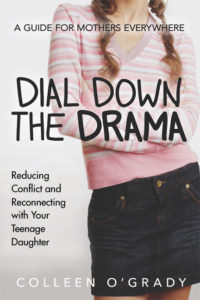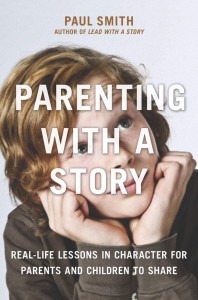Podcast: Play in new window | Download | Embed
Subscribe: RSS
Podcast (parenting-with-a-story-podcast-series): Play in new window | Download | Embed
Subscribe: RSS
 If you’re a parent of a teenager, you know this unfortunate truth: You love your child. But sometimes you don’t like them very much. And you know all too well that they don’t always like you very much either.
If you’re a parent of a teenager, you know this unfortunate truth: You love your child. But sometimes you don’t like them very much. And you know all too well that they don’t always like you very much either.
My guest this week has some great insights into why that is, as well as some very practical advice to rebuild the connection between you.
Colleen O’Grady is a licensed marriage and family therapist. She’s worked with hundreds of clashing mothers and daughters in her private practice and with desperate moms worldwide through her web-based Power Your Parenting programs. She’s also the author of the new book, Dial Down the Drama: Reducing Conflict and Reconnecting with Your Teenage Daughter—A Guide for Mothers Everywhere.
She joined me to share some advice from a chapter in her book entitled, “How to like your daughter again.” (Psst. . . It’ll work with sons, too.) In our discussion she shared three elements to a better mother-daughter connection. But she started with a description of the problem, which will look all too familiar to parents of teens. . .
Andrea and Natalie
It was a Thursday evening, a week after Thanksgiving, but Andrea and her daughter Natalie were far from thankful. Natalie, a junior in high school, was tightly wrapped in a blanket on my sofa. Her mother sat cross-legged next to her. It was clear that Natalie was hurt and that Andrea was angry.
It’s not working. I can’t take this anymore” Andrea said. “I’m just waiting till she graduates and is out of this house.”
Natalie was crying at this point and looking down. “Natalie wouldn’t get up this morning, so I kicked her,” Andrea continued. I was stunned. She said it matter-of-factly and with no apology. “I was hoping Natalie and I would have a good relationship, but it’s not possible.”
 Natalie had now shut down completely, so I asked her mom if I could speak to her alone. Natalie told me that Mom had come into her room yelling at her to get up and they needed to leave for school in twenty minutes. “Yes, she pissed me off,” Natalie told me, “and I wasn’t going to get out of bed after she yelled at me, but then Mom kicked me three times. I didn’t even touch her. She thinks I’m such a terrible kid, but I am making all A’s except in Algebra. You heard her. She can’t wait till I’m gone. She wonders why I am so unhappy.”
Natalie had now shut down completely, so I asked her mom if I could speak to her alone. Natalie told me that Mom had come into her room yelling at her to get up and they needed to leave for school in twenty minutes. “Yes, she pissed me off,” Natalie told me, “and I wasn’t going to get out of bed after she yelled at me, but then Mom kicked me three times. I didn’t even touch her. She thinks I’m such a terrible kid, but I am making all A’s except in Algebra. You heard her. She can’t wait till I’m gone. She wonders why I am so unhappy.”
This was neither a horrible mother nor daughter, but they had fallen into the downward cycle of drama. Andrea regretted her life as a teenager, when she didn’t make good grades and got pregnant in high school. She was doing everything she could to prevent Natalie from making the same mistakes. The problem was that her relationship with Natalie had been reduced to checking and monitoring her behavior 24/7. If this is all you have in your relationship with your daughter, you are not going to like her very much and she certainly won’t like you.
The lesson
A healthy relationship with your daughter is attainable and important, and there are three elements that make a secure connection:
- Being there for your daughter
- Being tuned in
- Being responsive versus reactive.
In our conversation, Colleen explains all three with some examples you should be able to use with your own child. After hearing them, I’m convinced they’ll work with sons too, so I’ll be trying them with my boys.
My favorite piece of advice was Colleen’s analogy to help understand what “Being there for your daughter” means. First, she explained that being there means being available when your child is ready and interested in connecting with you, not when you want to. It’s often going to be at in inconvenient time for you. It might even be at 10 o’clock at night. She said to “think of your daughter like a cat. You can’t tell your cat to come to you. The more forceful your approach to your cat, the more she runs away and hides. But when you chill out on the sofa, the cat jumps up and nuzzles up to you. Just like a cat, your daughter is going to bolt if you try to force the conversation.”
Whenever it happens, and it will, drop what you’re doing and spend time with her. It may only be 5 minutes. But it will likely be the 5 most important minutes in your day.
Click the play button above to listen to the full discussion, including advice on the other two element to build a better connection with your daughter.
—
 Paul Smith is one of the world’s leading experts on business storytelling. He’s a keynote speaker, storytelling coach, and bestselling author of the books Lead with a Story and Parenting with a Story.
Paul Smith is one of the world’s leading experts on business storytelling. He’s a keynote speaker, storytelling coach, and bestselling author of the books Lead with a Story and Parenting with a Story.

 Connect with him via email here.
Connect with him via email here.
Follow him on Facebook, LinkedIn, Twitter.
Sign up for his newsletter here to get one new story a week delivered to your inbox.

